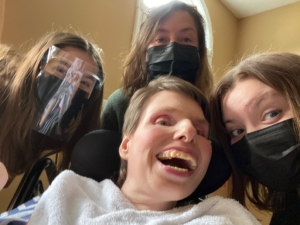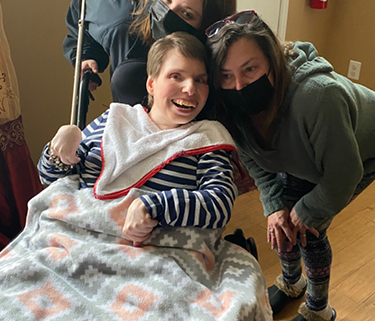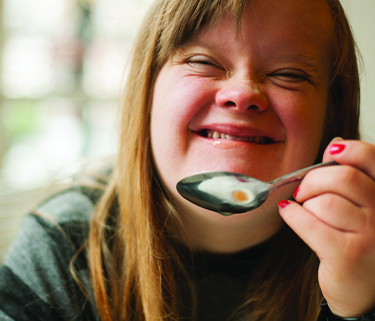We Were Afraid of Change, But The Arc Was There
When Amy was born in 1967, her family was told that she needed to live in an institution to get the medical care and services she needed due to her inability to speak and move independently. Her family followed doctor’s orders and placed in her an institution in California, where the family lived at the time. All her sister, Laurie, recalls of the institution is her sister’s tears. She cried every time the family left from a visit.
Amy lived in institutions for many years—but she and her family never could have imagined what waited for them on the other end of her time there.
Life at the Northern Virginia Training Center
The family moved to Virginia in 1975. Amy and Laurie’s parents found eight-year-old Amy a place in the Northern Virginia Training Center—another institution. For many years, the institution was all that Amy, Laurie, and their family ever knew. Amy appeared very happy there. As a child and teenager, Amy attended a day program in the local school system, and there were dentists and doctors on the campus of the institution. Amy and Laurie’s family would even invite staff from the institution to join them for family dinners. As an adult, Amy began to seem a bit sad when she aged out of the services available by the school system. Her post-high school activities included a day program where she crushed cans.
Amy’s family was dedicated to Amy and making sure she could get out and do things she liked. However, the institution did not have the resources to take Amy and the other residents off the institution campus and they did not even have a lift that could help them move Amy around. So, if Amy wanted to go somewhere, her family had to take her. As Laurie and their parents got older, they weren’t as able to do this and it really limited Amy’s ability to get out and go shopping or see movies. Similarly, when Amy would get sick or have surgery, Amy and Laurie’s parents would have to stay with her in the hospital because there was not enough staff from the institution to provide care, and the hospital staff were not trained to take care of her properly.
When Virginia decided to close the institution in 2016, Amy and Laurie’s family were one of many who would fight for the institution to remain open—firmly committed to the center that had served their family for so many years. This at times put Amy and Laurie’s family and other supporters of the institution in direct conflict with The Arc and its local chapters, which were powerful advocates to expand community-living supports and end the use of institutions.
However, Amy and Laurie’s family could read the writing on the wall and began talking with The Arc about what life could look like next for Amy.
The Arc: New Freedom

Laurie was working for an elected official in Virginia and knew the leadership at her local chapter of The Arc.
While they had different opinions, The Arc of Greater Prince William County’s leader, Karen Smith, was very respectful to Amy and Laurie’s family. Karen learned about Amy’s unique needs and preferences and helped build a group home setting that would work for her. Through it all, The Arc never gave up on Amy and Laurie’s family and made sure to reassure them that Amy would get the help she needed in the community.
The transition went smoother than the family expected. Amy’s group home was near Laurie and her parents, and the family could visit Amy as much as they wanted.
Most importantly, there were huge and wonderful changes for Amy.
Laurie and her parents worried at first about Amy having her own room. In the institution, Amy shared a room with the same roommate for nearly 30 years. They thought she would be scared and would want them to stay overnight with her. Laurie had even packed an overnight bag just in case Amy needed her. However, Amy loved having her own space—and decorating her own room. According to Laurie, “she has more new comforters than I have ever had in a lifetime.” Amy also enjoys the atmosphere of the home. She is treated as an individual, lives in a beautiful neighborhood with a garden out front to explore, and sits on the screened porch to enjoy the view of the woods behind her home.
Amy is also able to go out on her own and do things she wants to with Laurie or the group home staff. Amy, a housemate, and her staff go to shows together and her group home staff take her out to shop at the mall and go to the movies regularly. Amy also attends a day program for adults in the community that she is always very excited for. The day program is also only a mile from Laurie’s home and Laurie is welcome to visit her sister at any time. According to Laurie, “it is really nice to be able to pop in and say ‘hey, how’s it going’ and hang out with her.”
In this past year, due to the COVID-19 pandemic, life has changed again for Amy and Laurie. However, even in a terrifying pandemic, the group home staff have still helped Amy do things that matter to her. Though she has not been able to get out as much, Amy has been using her iPad and phone extensively. Laurie regularly gets videos of Amy where she makes faces and expresses to Laurie how she is really feeling. Laurie can send gifts to Amy to keep her cheerful and in early April 2021, Laurie and Amy were finally able to reconnect in person. They are hoping to take a shopping trip soon!
Advice for Others on Embracing Change and the Possibilities it Brings
We asked Laurie what she would want to tell others about her family’s experience over the years. She said that “there is always a fear of change,”— but in that change is a possibility for growth you may not have imagined before.
“I can’t emphasize enough how much The Arc of Greater Prince William County was there to make sure that people are happy. They go out of their way to make sure that people get what they need, like getting a much-needed haircut in the pandemic. The people there put a real personal stamp on everything they do. I just want to make sure that they get all the credit the deserve—especially the group home manager, who is wonderful.”
How You Can Help
There are still institutions open today in 36 states across the United States. For many, the institution is all they know– and they and their families may fear what change means for them.
There may be fear from past failed attempts at community living or concerns that people with more support needs can’t be safe and healthy in the community. But that fear can be overcome with the right level of supports and a caring community-based disability service provider, like The Arc of Greater Prince William County and The Arc’s chapter network.
What we know is that most people with disabilities and their families do want access to a life in the community, no matter the level of supports necessary to make that happen. But when they try to find what they need, too often the system fails them and makes them wait for services. This must change.
Join us to help make sure that everyone can get the support that they need in their community!
Visit thearc.org/MedicaidCantWait to learn more and see how to advocate with us.






 Steve has cerebal palsy. For most of his young life, and like many people with disabilities, he lived with his mom. When Steve was only 22 years old, his mom became very ill. Because she could no longer provide the supports he needed, Steve was forced to move into a nursing home to get the care he could no longer receive in his childhood home. Even though Steve knew he could make it in the community with the right supports, he was forced to make this move. This was because his family was concerned about his well-being if he lived independently, and because they feared the appropriate supports were not available to him.
Steve has cerebal palsy. For most of his young life, and like many people with disabilities, he lived with his mom. When Steve was only 22 years old, his mom became very ill. Because she could no longer provide the supports he needed, Steve was forced to move into a nursing home to get the care he could no longer receive in his childhood home. Even though Steve knew he could make it in the community with the right supports, he was forced to make this move. This was because his family was concerned about his well-being if he lived independently, and because they feared the appropriate supports were not available to him. There were no supports available outside of the public schools and the schools were not prepared to serve children with high levels of need. When my brother was kicked out of school at a very young age (before the federal law ensuring a right to education) for his disability-related behaviors, he had nowhere to go except home all day with a very loving caregiver. He missed the routines and rhythms of school and had a hard time staying home while everyone else went to work or school daily. He waited all day for the staggered returns of kids and parents, dinner, and then his beloved ride to the drugstore for a Coke and a long drive listening to rock and roll and beach music on the radio. Jud also had daily trips to the Post Office with our Dad to pick up the mail for his business, trips to the barbershop, church on Sundays, other local gathering places, and a house full of our friends and exchange students who lived with us at various times. He loved all the interaction and was known all over town.
There were no supports available outside of the public schools and the schools were not prepared to serve children with high levels of need. When my brother was kicked out of school at a very young age (before the federal law ensuring a right to education) for his disability-related behaviors, he had nowhere to go except home all day with a very loving caregiver. He missed the routines and rhythms of school and had a hard time staying home while everyone else went to work or school daily. He waited all day for the staggered returns of kids and parents, dinner, and then his beloved ride to the drugstore for a Coke and a long drive listening to rock and roll and beach music on the radio. Jud also had daily trips to the Post Office with our Dad to pick up the mail for his business, trips to the barbershop, church on Sundays, other local gathering places, and a house full of our friends and exchange students who lived with us at various times. He loved all the interaction and was known all over town. Sadly, as each of his older siblings began to leave home for college, military service, or otherwise, Jud’s physical size and his inability to control his frustrations and emotions became dangerous for our aging parents. After much searching and trying many approaches, the only available service for someone with his needs was the state institutional system. This was devastating for Jud, for our whole family, and for the many friends who had known him over the years. Jud suffered greatly from the travel distance from his family (even though we visited regularly), home and hometown, friends, and routines. And while there were some wonderful staff who supported him in his new location, we were horrified to learn that he also suffered some terrible abuses– the kinds of things that can be hidden when people who are unable to communicate or be understood cannot tell others what is happening to them. My father found that Jud had been burned with cigarettes and that other men in his unit had been more extensively burned. In other incidents, men in his unit died after being subjected to dangerous restraint methods. He also suffered from toxic environmental conditions, including asbestos and sewage leakage. As a family, we were determined to end these abuses.
Sadly, as each of his older siblings began to leave home for college, military service, or otherwise, Jud’s physical size and his inability to control his frustrations and emotions became dangerous for our aging parents. After much searching and trying many approaches, the only available service for someone with his needs was the state institutional system. This was devastating for Jud, for our whole family, and for the many friends who had known him over the years. Jud suffered greatly from the travel distance from his family (even though we visited regularly), home and hometown, friends, and routines. And while there were some wonderful staff who supported him in his new location, we were horrified to learn that he also suffered some terrible abuses– the kinds of things that can be hidden when people who are unable to communicate or be understood cannot tell others what is happening to them. My father found that Jud had been burned with cigarettes and that other men in his unit had been more extensively burned. In other incidents, men in his unit died after being subjected to dangerous restraint methods. He also suffered from toxic environmental conditions, including asbestos and sewage leakage. As a family, we were determined to end these abuses. Jud’s experiences fueled my passion to change the system. I worked in Washington to pass federal legislation to move the Medicaid funding bias away from institutions and to build the community service system, making the community the preferred service setting. My advocacy led me to a career in The Arc’s national public policy office, which I joined in 1984. While our systems have evolved since the 70s through the late 80s when my brother was experiencing so much pain, we still have a long way to go. I am happy to report that Jud was eventually able to leave the state institution and live in a group home about 7 minutes from our widowed mother in his beloved hometown for the last 20+ years of his life. Jud also experienced some serious problems in his group home, but those were able to be discovered and remedied because family were nearby and able to observe how he was doing. For those who understood him, Jud continued his mantra: “Stay at the new house; not gonna keep saying it” throughout those years, lest anyone think he would ever want to go back to the institution.
Jud’s experiences fueled my passion to change the system. I worked in Washington to pass federal legislation to move the Medicaid funding bias away from institutions and to build the community service system, making the community the preferred service setting. My advocacy led me to a career in The Arc’s national public policy office, which I joined in 1984. While our systems have evolved since the 70s through the late 80s when my brother was experiencing so much pain, we still have a long way to go. I am happy to report that Jud was eventually able to leave the state institution and live in a group home about 7 minutes from our widowed mother in his beloved hometown for the last 20+ years of his life. Jud also experienced some serious problems in his group home, but those were able to be discovered and remedied because family were nearby and able to observe how he was doing. For those who understood him, Jud continued his mantra: “Stay at the new house; not gonna keep saying it” throughout those years, lest anyone think he would ever want to go back to the institution.







